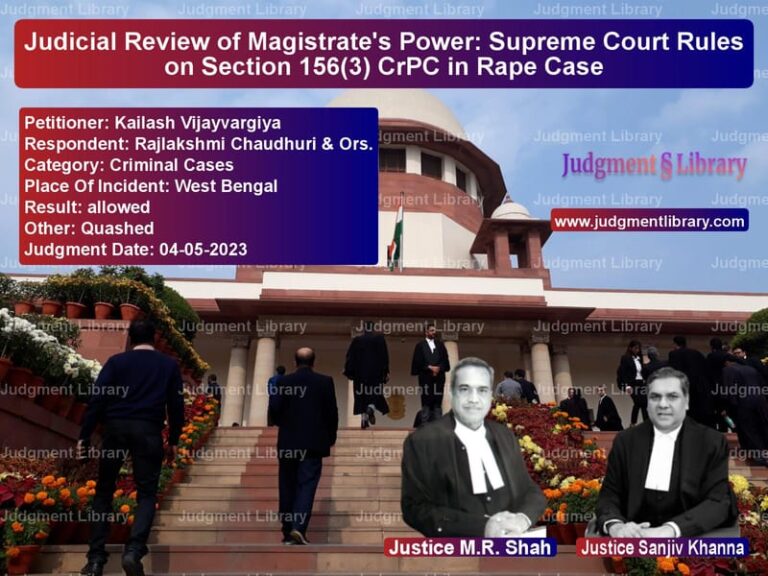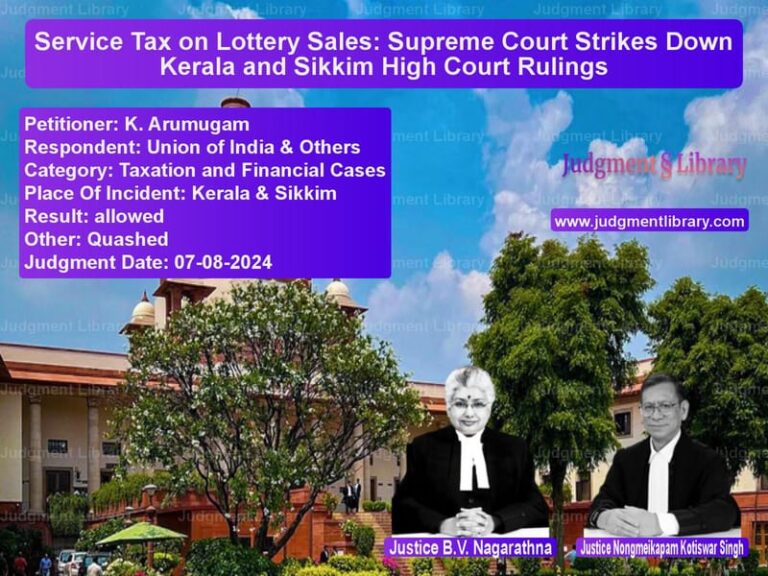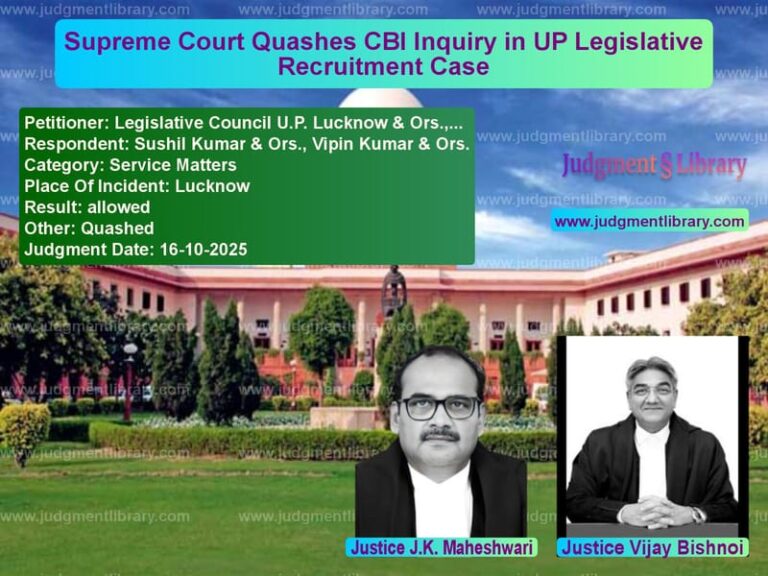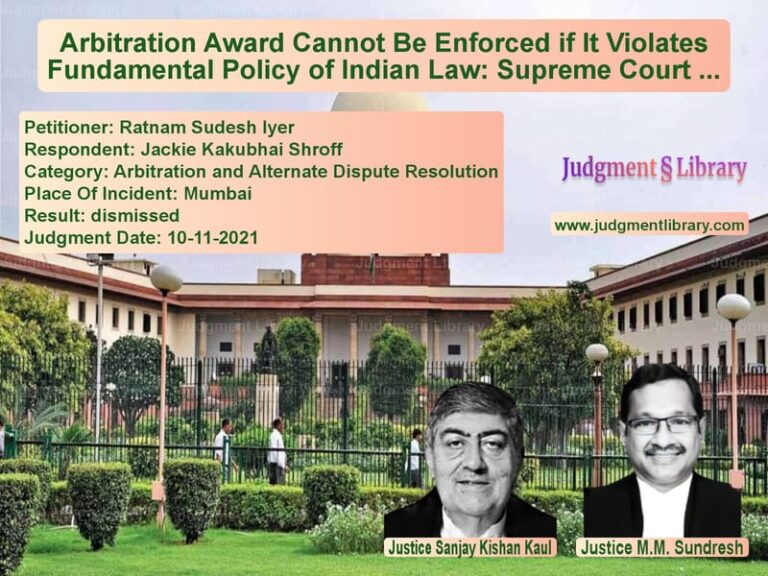Legal Battle Over Bangalore Mysore Infrastructure Corridor: Supreme Court’s Verdict
The case of Bangalore Mysore Infrastructure Corridor Area Planning Authority & Anr. vs. Nandi Infrastructure Corridor Enterprise Limited & Ors. revolves around a long-standing dispute over land use, zoning regulations, and contractual obligations under the Framework Agreement (FWA). The Supreme Court’s judgment addresses whether the respondents, NICE and NECE, were entitled to construct a group housing scheme in the project area without obtaining prior approval from the State.
This litigation marks the fifth round of legal disputes regarding the Bangalore Mysore Infrastructure Corridor Project. The primary contention was whether the rejection of NICE and NECE’s application by the Planning Authority was lawful or arbitrary.
Background and Legal Issues
The dispute originated when NICE and NECE sought permission to develop a group housing scheme within the project area under the terms of the FWA. The Planning Authority rejected their request, citing zoning regulations, absence of required permissions, and potential deviations from the original project plan.
The High Court of Karnataka ruled in favor of NICE and NECE, directing the Planning Authority to issue a Commencement Certificate for the project. Aggrieved by this decision, the Planning Authority and the State of Karnataka appealed to the Supreme Court, arguing that the project was not in conformity with the FWA and that prior approval from the State was necessary.
Arguments of the Petitioners (Planning Authority and the State)
The petitioners contended that the respondents’ proposal was not in accordance with the agreed-upon development plan and violated the framework set under the FWA. Their key arguments were:
- The FWA specifies the creation of five designated townships within the infrastructure corridor, and the group housing scheme proposed by the respondents was outside these designated areas.
- The respondents had not obtained prior approval from the State for modifying the project plan, a requirement clearly outlined in the FWA.
- The proposed development did not include necessary township infrastructure such as schools, hospitals, commercial complexes, and parks, making it an incomplete and unauthorized alteration of the original project.
- The High Court erred in directing the Planning Authority to issue a Commencement Certificate without considering the contractual obligations set in the FWA.
Arguments of the Respondents (NICE and NECE)
NICE and NECE argued that the rejection of their application was arbitrary and against the principles of fair governance. Their key arguments were:
- The Outline Development Plan (ODP) categorized the land in question as residential, which made it permissible for group housing development.
- The Planning Authority had previously granted similar approvals for other residential projects in the vicinity, and the denial of their application was an instance of selective and discriminatory treatment.
- Their proposal was in line with the urban planning requirements of Bangalore and contributed to the overall development of the infrastructure corridor.
- The rejection was based on extraneous reasons and did not reflect a fair application of zoning laws and planning regulations.
Supreme Court’s Observations
The Supreme Court scrutinized the provisions of the FWA and the reasons cited by the Planning Authority for rejecting the application. It observed:
“The planning and execution of infrastructure projects must adhere to the agreed framework, and unauthorized deviations cannot be permitted without proper approvals.”
The Court examined the fundamental aspects of the FWA and noted that the agreement was a legally binding contract that prescribed specific locations for townships and development projects. The Court pointed out:
- The FWA explicitly designates five townships, and the respondents’ proposed group housing scheme was outside these designated areas.
- The FWA provides a mechanism for modifications, requiring prior State approval. The respondents did not seek such approval.
- The Planning Authority acted within its rights in rejecting the application, as the respondents failed to provide necessary No Objection Certificates (NOCs) and approvals from relevant State authorities.
The Court further held that the High Court erred in issuing a writ of mandamus compelling the Planning Authority to approve the project without adherence to the contractual terms.
Final Judgment
Based on the findings, the Supreme Court set aside the High Court’s decision and upheld the rejection of the respondents’ proposal. The judgment concluded:
“The contractual obligations under the FWA must be strictly followed, and no party can unilaterally modify the project plan without prior approval from the competent authorities.”
The Supreme Court’s ruling reaffirmed the legal position that infrastructure projects must be executed as per their approved frameworks and cannot be altered arbitrarily. The decision strengthens the enforcement of contractual obligations and zoning regulations in large-scale development projects.
Petitioner Name: Bangalore Mysore Infrastructure Corridor Area Planning Authority & Anr..Respondent Name: Nandi Infrastructure Corridor Enterprise Limited & Ors..Judgment By: Justice A.M. Khanwilkar.Place Of Incident: Bangalore, Karnataka.Judgment Date: 19-05-2020.
Don’t miss out on the full details! Download the complete judgment in PDF format below and gain valuable insights instantly!
Download Judgment: Bangalore Mysore Inf vs Nandi Infrastructure Supreme Court of India Judgment Dated 19-05-2020.pdf
Direct Downlaod Judgment: Direct downlaod this Judgment
See all petitions in Property Disputes
See all petitions in Landlord-Tenant Disputes
See all petitions in Specific Performance
See all petitions in Damages and Compensation
See all petitions in Judgment by A M Khanwilkar
See all petitions in dismissed
See all petitions in supreme court of India judgments May 2020
See all petitions in 2020 judgments
See all posts in Civil Cases Category
See all allowed petitions in Civil Cases Category
See all Dismissed petitions in Civil Cases Category
See all partially allowed petitions in Civil Cases Category







